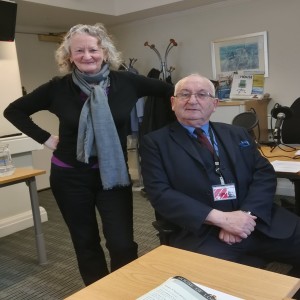Episodes

Thursday Jul 02, 2020
Thursday Jul 02, 2020
Jenny went on the Stay in with Sian Show to discuss the Covid Emergency Powers, the failed App and the government's attempt to by-pass Parliamentary Democracy with the use of secondary legislation.

Sunday May 10, 2020
Green Jenny Jones talks to Molly Cato about Covid and the economy
Sunday May 10, 2020
Sunday May 10, 2020
Green Jenny Jones talks to Molly Cato about Covid and the economy. What actions can we take that both support people through the crisis and create a better world as we emerge on the other side.

Monday May 04, 2020
Monday May 04, 2020
Community shielding is the best way of doing tracking and tracing. It also creates a support network that helps people as they self isolate for the good of that community. It is a better way of doing things that a government phone bank and app.

Monday Apr 27, 2020
Monday Apr 27, 2020
Apologies for the occassional crackly sound quality (as recorded on Zoom with poor broadband), but the discussion is good.
Will remote working stick as we come out of lockdown? Can we reclaim the space in our streets for walking and cycling? Why the government needs to record Covid cases by occupation as the frontline workers in buses and taxis are hit hard.
Should the railways be nationalised as a result of this crisis?

Friday Apr 03, 2020
Friday Apr 03, 2020
She discusses John Bird's formative experiences. Homelessness and his scheme to provide rent deposits for those on low incomes

Wednesday Jun 26, 2019
Green Jenny Jones talk to Shane Collins about how to decriminalise drugs
Wednesday Jun 26, 2019
Wednesday Jun 26, 2019
I worked with Shane for years in the London Green Party, before he moved to Frome and got himself elected to Mendip District Council. He has been very involved with writing the Green Party's policy on drugs, as well as campaigns like Reclaim the Streets in the 1990s.
In a previous episode of Jen’s Green Jam I spoke to an ex-undercover police officer, Neil Woods about the war on drugs and how it has affected law enforcement, in this episode we are going to be talking about Britain’s drug policy and thinking about the practicalities of reforming the government's approach to drugs.
Shane discusses:
- Some of the big things that worry people about drugs are the addiction potential and the health impacts - how do we best address those concerns?
- The different models of legalisation and decriminalisation. Is there a one size fits all solution or is it more nuanced than that?
- What is the ideal drug policy and how do we get from where we are now to that ideal?
- Do we think that drugs gangs will just disappear or turn into tax paying businesspeople?
- How do we ensure that we protect vulnerable people like kids and people who struggle with addiction?
- What is holding the UK back from a better drug policy?
- Lots of countries around the world are moving away from criminalisation and trying different approaches, so are there any specific places that we should be looking to for inspiration?
- It looks like the Government is softening its stance on medicinal cannabis, what can we expect when they publish some new guidance later this year?
- What can individuals and communities do to help make a positive change?

Wednesday May 15, 2019
Wednesday May 15, 2019
Mike Schwarz has been a human rights lawyer at Bindmans for 25 years. He has represented numerous campaigners, including all three of Jenny's part time staff. He describes the ups and downs of the right to protest over those years.
The crucial lesson is that peaceful protest is vital to the health of our democracy. While individual court cases are important, they have to be seen as part of a process that influences how society and the police handle peaceful dissent.
He regards his most significant case as the Kings North six. These protestors admitted trying to shut down the coal powered station by occupying the smokestack and painting the word "Gordon" down the chimney but argued that they were legally justified because they were trying to prevent climate change causing greater damage to property around the world. It was the first case in which preventing property damage caused by climate change had been used as part of a "lawful excuse" defence in court. A majority of the jury agreed with them.
The police have a duty to facilitate protest, but their desire to do this ebbs and flows. That desire reached a highpoint after the death of newspaper vendor Ian Tomlinson during the G20 protests, as he was struck by an officer from behind when he was walking away with his hands in his pockets and was not part of the protests. However, it diminished quickly after the London riots of 2011.
Mike is worried that democratic expressions of dissent are being undermined by cuts to legal aid and judges increasingly ruling against the use of defences which justify actions taken for the greater good. Judges are closing off the legal options where people have caused minor damage to property, or got in the way of companies doing business, without addressing the problems/concerns that lead people to protest about illegal wars, or weapons of mass destruction, GM crops or climate change.
The Mitting Inquiry into undercover policing is an example of a judge taking a conservative view of secrecy and state power. The judge may be misogynistic and hold out-dated views about equality, but the Inquiry could still have positive outcomes because the campaigners themselves are very organised and have done the bulk of the investigating. This has been time consuming, but they have exposed a lot of the dirty dealings that spycops have been involved with.
Our society needs to give more respect to those without money or power, who have to use non-violent protest as their way of getting attention and gaining influence. We must give them an equivalence with those who can act in the dark, by having the personal access to lobby, or via large donations.
It is deeply disturbing to watch how the courts are bending over to accommodate companies with deep pockets that are seeking civil injunctions. These injunctions against 'persons unknown' can cost individual campaigners thousands of pounds, or even their house, but include activities such as 'slow walking'. Although these companies have deep pockets, they do not have right on their side. Courts need to get a grip and define the limits of the right to protest.

Tuesday Apr 16, 2019
Jenny Jones talks to Sian Berry about London politics and green success
Tuesday Apr 16, 2019
Tuesday Apr 16, 2019
Sian Berry is a co-leader of the Green Party, a London Assembly Member and a local councillor in Camden. She talks to Jenny Jones about her success with getting the London Mayor to change his policies on housing and to lobby the government to change their policies. She is part of Generation Rent and has championed their issues, such as a rent cap.
Sian's successes build on the sixteen years of practical changes achieved by Jenny and Darren when they were Green Party members of the London Assembly. This track record of success enabled both Jenny and Sian to come third in the Mayoral elections. Sian got the higest number of second preference votes and they discuss the prospect of a Labour vs Green run off in 2020.

Wednesday Mar 13, 2019
Green Jenny Jones talks to Amelia Womack, Deputy Leader of GP about fast fashion
Wednesday Mar 13, 2019
Wednesday Mar 13, 2019
Good fashion is timeless. Fast fashion is destroying the planet and linked to poverty wages around the globe. Amelia explains why there is no such thing as cheap fashion as someone somewhere is always paying for it in poverty wages and a polluted environment. There are an estimated 168m children working in the fashion industry.
The podcast concludes with the usual rebuttal section to help listeners deal with the usual responses and issues that are raised when campaigners call for changes to be made.

Tuesday Feb 19, 2019
Tuesday Feb 19, 2019
Chris Holmes talks about his life and organising the 2012 paralympics. The innovations that made 2012 a success and the hostility that had to be overcome. He talks about his life as a lawyer and improving accessibility in the workplace. How many of the lessons learned about dealing positively with disability can also be applied to other areas where people face social barriers and discrimination. As always with these podcasts, they end with a 'myth busting' session, where Jenny and her guest answer some of the common comments/criticisms.

